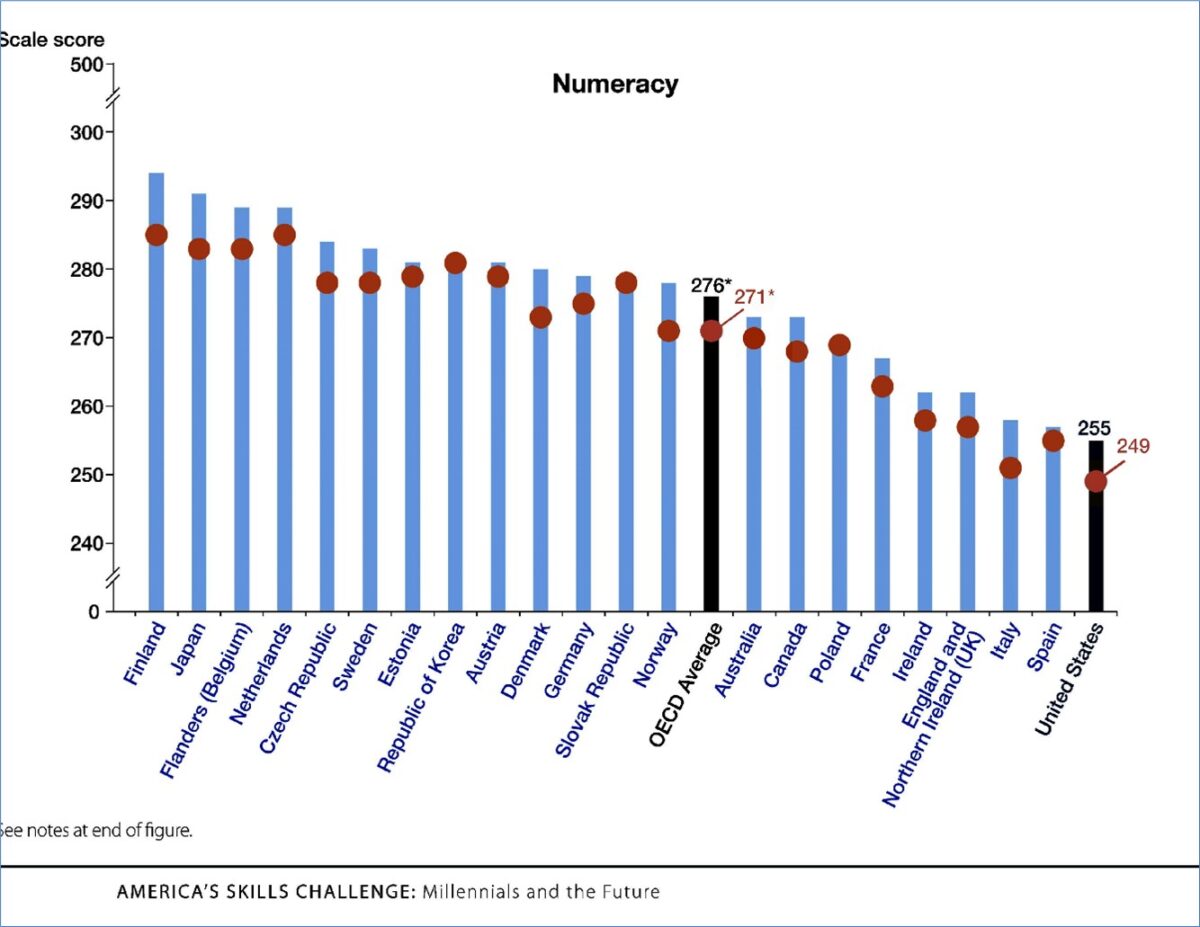
In K-12 education, can Virginia lead the nation? If that’s the goal, in my view as a career educator, Dr. Lisa Coons is the best possible choice as our new state Superintendent. As Chief Academic Officer in Tennessee, the programs she guided to help teachers improve reading instruction are among the best in the nation.
But in Virginia, challenge #1 is mathematics. The department Dr. Coons now leads is tentatively scheduled in June to submit to the state Board of Education a proposed revision of our K-12 math Standards of Learning (SOLs). Workforce math skills are vital for our nation’s prosperity and defense, but current standards, in both our state and nation, are failing to teach mathematics effectively.
The evidence? On national standards, much of it can be found in the International Journal of Mathematics Education, among other places.
- On a 2012 international test of numeracy skills for citizens aged 16 to 34, among 22 tested nations, the United States ranked dead last.
- Since 2012? In national NAEP LTT testing in January 2020, before the U.S. arrival of Covid-19, math scores were lower than in 2012 for nearly every student group.
- As noted by columnist George Will, “About 76,000 students each year receive from U.S. universities advanced degrees in engineering disciplines …. Of those graduates, about 43 percent are U.S. citizens….”
- Electrical engineering (EE) is an especially important field in the competitive world economy. Of EE doctorates awarded by U.S. universities, the proportion going to non-U.S. citizens rose from 62% in 2010 to 70% in 2019. Almost as many U.S. EE Ph.D.’s went to citizens of China as to U.S. citizens.
Many of these “best and brightest” from around the globe stay in the U.S. and contribute disproportionately to our economy. But one wonders: How long will U.S. taxpayers support higher education their children are not being prepared to enter?

gure 1. Average scores in numeracy for age 16-34 (bars) and age 16-24 (red dots): OECD PIAAC 2012. (From Goodman et al. 2015, Data © OECD 2012. Used with permission.)
What Went Wrong
As a major factor explaining these results, scientists who study learning have found that in teaching mathematics, the methods required by U.S. K-12 standards have proven to be inefficient and/or ineffective.
Historically to learn math, students had no choice but to memorize fundamental facts and procedures. Change arrived in the 1980’s as low-cost calculators to solve arithmetic became available.
Another change was a 1989 agreement by state governors to adopt “standards” to direct K-12 instruction. By 2003, all states had adopted standards. As Tom Loveless points out in Stability and Change in American Education, for guidance in math, most relied on standards proposed by the National Council of Teachers of Mathematics (NCTM), an organization heavily influenced by professors in schools of education.
The NCTM standards called for “calculator use at all grade levels” and for students to “create” procedures to solve arithmetic rather than be taught a standard procedure. “Decreased attention” was recommended for “memorizing” and “rote practice.”
The NCTM had impact. By 2003, most states required teachers to prepare students to use calculators to solve arithmetic on 3rd grade state testing. As textbooks changed, parents complained their children’s ‘create math’ homework did not work. And it turned out parents were right.
What Science Says
Starting in the 1990’s, with help from new technologies, scientists were investigating how the brain learns mathematics. By 2008, cognitive scientists had discovered that because of its structure, the human brain is very good at solving problems when needed information can be quickly retrieved from memory — but is very limited when needed information cannot be quickly recalled.
As one example, scientists found as a foundation for learning mathematics, students need to thoroughly memorize all of the “basic facts of arithmetic, such as 9+6=15 and 56/8=7, as had been required pre-calculator. In 2009, University of Virginia cognitive scientist Daniel Willingham advised educators, “Automatic retrieval of basic math facts is critical to solving complex problems.”
Science also documented that in the limited instructional time available, achieving quick recall of the over 250 basic math facts requires ‘drill and practice’ such as flashcard use.
But the NCTM has continued its opposition to science. In a March 2023 “position paper,” the NCTM reiterated its claim students can avoid memorizing basic facts by applying complex and time-consuming “calculation strategies.” At no point in the past 15 years has the NCTM addressed why their leaders believe verified findings of science should be denied.
Concerns about falling test scores led to drafting “Common Core Math Standards” (CCMS) in 2010. Unfortunately, among those asked to draft or vote to approve the new standards, none were cognitive scientists. At most points, the CCMS aligned with positions of the NCTM, and the CCMS were adopted by 45 states.
Virginia SOLs
For many years, Virginia’s students were fortunate. As math supervisor and then Superintendent of the Virginia Department of Education, Dr. Patricia Wright listened to science. Between 1995 and 2015, our math SOLs called for helping students commit to memory all the basic math facts, and by the last year those standards were in place in Virginia classrooms, our scores on the National Assessment of Educational Progress (“main NAEP”) had risen to be in the top five states in the nation.
But after Dr. Wright’s retirement, new math SOLs were adopted in 2016 and implemented in 2019. At key points, the memorization of basics required by prior SOLs was replaced. Substituted were the NCTM/Common Core “calculation strategies.” The current SOLs do not ask that students know from memory any basic arithmetic facts.
The impact? While much of it can be attributed to the effects of school shutdowns during Covid, Virginia’s 4th grade math scores on the 2022 NAEP showed the largest decline in the nation, dropping 11 points (vs. a national drop of five points), and eight points in 8th grade math.
All of us would hope memorization could be avoided, but science says in learning math, thorough memorization of basics is essential. When state standards require instruction based on magical-thinking that denies science, what achievement should we expect? What will be the consequences for our state and nation?
Going Forward
Superintendent Coons will submit revised SOLs to the state Board in June or thereafter, followed by public hearings, opportunity for public comment, and a final Board vote.
In December of 2022, I joined about 20 “stakeholders” invited to review a draft of the revised SOLs prepared by math staff of the Department of Education. At many key points, the December draft called for the opposite of what science recommends.
Several of us wrote to staff and leaders detailing our concerns. Appointed leaders replied and stated their strong support for standards that were science-based. But at this point, the draft to be submitted for Board consideration has not been released.
From my personal readings in the science of learning, I can attest: How the brain learns is complex — and often counter-intuitive. In June, our new Superintendent will have been on the job for only two months. Department leaders have immense responsibilities for managing state education at all levels.
Governor Youngkin recently proposed a Numeracy Act similar to the 2022 Virginia Literacy Act (VLA) that passed the General Assembly unanimously. The VLA emphasized: Instruction must be science-based. The Numeracy Act will need a foundation of science-based SOLs.
In this SOL revision, I hope Department leaders will set as a goal writing math standards that can serve as a model for the nation. As one step in the process, a team of cognitive scientists should be asked to review the current draft and recommend changes if needed. The team might also include faculty from math “special education” who have experience applying the science of learning to improve instruction in real K-12 classrooms. Virginia’s universities are home to many nationally recognized experts in both areas.
Our nation desperately needs math standards that work. Virginia can lead the way. Let’s base instruction for our children not on wishful thinking that has failed, but on tested strategies science says have proven to be effective.
Eric (Rick) Nelson is a Visiting Fellow with the Thomas Jefferson Institute for Public Policy. He served 28 years with the Fairfax County Public Schools teaching math-intensive chemistry and physics. For more than 10 years, he was an elected president of the Fairfax County Federation of Teachers/AFT/AFL-CIO. Currently, Rick works with college educators to publicize cognitive research on how students learn in math, sciences, and engineering. He may be reached at EANelson@chemreview.net
- Welcome, Dr. Coons!Let’s Talk Math - April 25, 2023
- Virginia’s Math SOLs: Science-Based — or Common Core? - February 20, 2023
